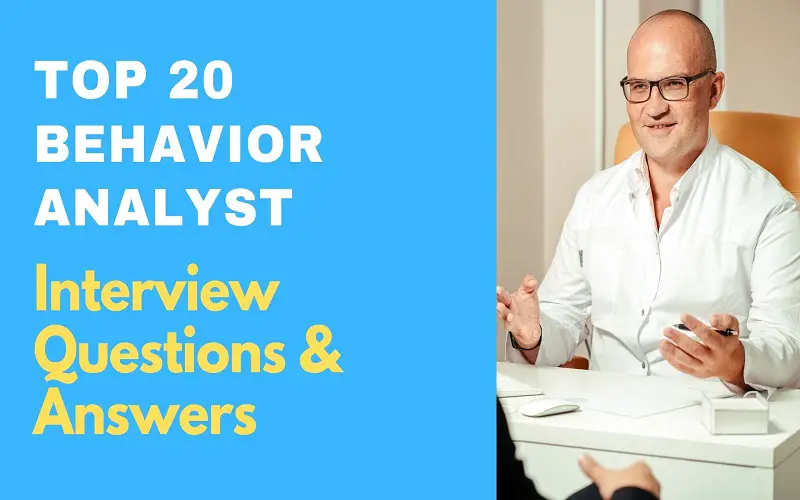Behavior analysts are very important professionals when it comes to analyzing human behavior. If you are preparing for an interview for this role, we’ve got you covered. Below is a list of 20 commonly asked interview questions together with their answers.
1. Why are You Interested in This Role?
Employers often ask why you are interested in this role to assess your motivation. To successfully answer this question, you need to understand the employer’s needs. Demonstrate how you will meet those needs.
Sample Answer
I believe that my skills will help me contribute directly towards improving customer service practices while reducing absenteeism rates through effective performance management programs. This role has excellent potential for growth within the organization which ultimately means more opportunities for me.
2. Share with Us Your Greatest Achievements
One of the most common behavioral analyst interview questions is what are your greatest achievements. This question often reveals if you have a good work ethic and how passionate you are about success. Share in detail two or three examples of your accomplishments that demonstrate leadership skills.
Sample Answer
One of my greatest achievements is successfully implementing a behavior program for our youngest patients. It required me to work closely with the team, parents, and students on all aspects of the project, such as research, budgeting, training, and maintaining progress charts. At the end we achieved our goal.
3. What are the Roles of Behavior Analyst?
This question often reveals if you have researched this profession or not and your knowledge about it. There are many different aspects to being a behavior analyst, such as assisting in designing, implementing, and evaluating programs that focus on human development and growth while promoting independence through personal responsibility.
Sample Answer
The primary responsibilities of a behavior analyst include helping create individualized interventions for children with autism spectrum disorder by guiding parents based on their child’s specific needs. They are also responsible for monitoring progress charts periodically, which will help them identify any adjustments that they may need to make during treatment plans to continue improving the success rates.
4. Why Do You Feel You are the Most Suited for This Role?
Interviewers usually ask this question to see if you have researched the company or not. The best answer explains how your skills and experience are a good fit for what they need to be successful.
Sample Answer
I am confident I can excel at this role because my background in psychology and education has given me knowledge of how human behavior develops over time, which you were looking for in this position. I also have a lot of experience working with children and feel that my skills would be an asset to your company.
5. Describe a Time When You Failed in This Role and the Lessons You Learned
Interviewers ask this question to see if the applicant has dealt well with adversity and how they have used it as an opportunity for growth in their life. Describe a situation in which you failed and how you handled it.
Sample Answer
One of the challenges I had in my last position was finding ways to motivate employees who did not feel that they fit into our environment. I came up with different incentives, such as volunteering days where staff members could help out at local organizations or come during office hours on Fridays to solve this problem. That ensured we spend more time together outside work which allowed them to be more comfortable around each other and open up better during team meetings afterward.
6. What are The Qualities That a Behavior Analyst Need to Be Successful?
Here, interviewers want to know how you handle difficult situations, such as a challenging relationship with the other person. Strong communication skills are essential for all aspects of this job, and working well in teams is critical.
Sample Answer
A behavior analyst should have strong interpersonal skills that include excellent verbal and written communication skills. That is important since they will be required to communicate often with both children and their parents, which can sometimes be challenging. Working on a team or individually also plays an integral role since we usually have groups working together at any given time while ensuring that each individual’s voice is heard without interrupting others who may not feel comfortable speaking up first.
7. How Do You Stay Motivated in Your Work?
Interviewers want to know how you stay motivated if the work get tiring or difficult. They also want to see what motivates you outside of your job since that will be something you need in this position. Highlight your sources of motivation.
Sample Answer
Maintaining a balance between my personal and professional life is essential because it helps keep me grounded when I’m dealing with challenging situations at work. I find comfort in spending time with loved ones, engaging in physical activities such as basketball and tennis, listening to music while reading good books, which usually lifts my mood after having a rough day.’
8. What Major Challenges Did You Face During Your Last Role? How Did You Manage Them?
Interviewers ask this question to see how well you can deal with adversity and if you have faced challenges like these before. Talk about any creative solutions used to work through these problems since creativity is essential for a behavior analyst.
Sample Answer
I had been working as an assistant at a private school when I started noticing that attendance was dwindling, along with student involvement in their classes, which led me to investigate what was going on. My boss contacted unhappy parents, so we came up with ideas such as having more parent-teacher conferences or assigning a teacher’s aid. We allocated that for parental support during staff meetings/office hours where they would answer questions from parents and help with homework.
9. Describe Your Daily Routine as Behavior Analyst
Interviewers want to see what the applicant’s daily routine is like and if they will handle tasks that need constant attention. Highlight your daily routine.
Sample Answer
During the day, I usually work on setting up assessment tools for students, such as conducting assessments or developing new ones before moving onto data entry which includes documenting behavioral observations into a database and taking notes during therapy sessions. Other duties include attending staff meetings where we discuss student progress while also discussing different strategies used in our classrooms.
10. Describe Briefly About Your Experience with Behavior Analysis
Interviewers want to know if you have experience in behavior analysis and their experience. They also want to make sure that there are no gaps or inconsistencies in your work history because it shows a lack of commitment which can be detrimental for this position.
Sample Answer
I have worked as an assistant at a private school where I’ve had my classroom with children from kindergarten through middle school. I provided psychotherapy support services on-site before branching out into another facility with more specialized programming such as autism therapy programs. My most recent position was working as a lead therapist at a treatment center for teenagers recovering from drug addiction when they asked me about growing up here and how life was different back then.
11. How Do You Communicate with Clients?
Interviewers may ask you questions related to how you communicate with clients to elicit positive change. Your responses regarding this issue will demonstrate your sensitivity to interpersonal communications while providing specific examples of how you have conducted yourself most effectively.
Sample Answer
I communicate with my clients by helping them understand the personal consequences of their behaviors. That helps me motivate them to make positive changes that produce long-lasting results over time. They make important decisions during treatment, such as the type of rewards given for target performance.
12. What is the Biggest Challenge That You Foresee in This Job?
The interviewer is looking for candidates who can identify potential challenges and offer possible solutions. Before answering this question, it is vital to research the employer’s business model/operation to understand the problem at hand. Also, be sure to highlight how your unique skill set will allow you to achieve the necessary results in the presented situation.
Sample Answer
One of the biggest challenges that I foresee in this job is devising an efficient scheduling procedure for staff members who have been performing over time while maintaining a high customer service quality. In my previous positions, this has proved challenging because employees often feel resentful towards unproductive coworkers and thus spend less time working and more time complaining.
I have had success in resolving this problem by instituting a bonus incentive program that encourages employees to perform their jobs effectively while maintaining a positive attitude towards coworkers, such as engaging in friendly competition.
13. What Kind of Strategies and Mindset Is Required for This Role?
Interviewers need to know your ability to step back and analyze a situation objectively, as well as your mindset for challenging problems. Show that you have used similar techniques in the past to achieve desired results with employees who were reluctant to change behavior or whose attitude was negative towards others.
Sample Answer
To successfully implement new performance management strategies, I need to gain employee consensus by offering them viable alternatives while explaining the benefits of implementing my recommendations.
By approaching employees in such an agreeable manner, I can earn trust, which allows me to identify and address underlying issues that arise when work productivity is affected by various factors, such as disengagement or lack of motivation.
14. How Do You Develop Treatment Goals?
According to the BACB (Behavior Analyst Certification Board), treatment goals are the foundation for a successful behavior-analytic treatment plan. Interviewers need to know how you would go about developing such goals. You need to demonstrate knowledge of behavior analytic principles, especially those related to the methods and techniques used in data collection.
Sample Answer
I start by collecting baseline information which allows me to identify target behaviors that need improvement or elimination. I then use natural environment data collection methods such as videotaping to accurately represent the frequency with which problematic behaviors occur outside of the lab setting. For example, suppose my patient is suffering from depression symptoms after being discharged from the hospital. In that case, I may videotape them at home to identify triggers contributing to the patient’s depression.
15. How Do You Provide Caregiver Training?
Interviewers tend to ask how to provide caregivers with adequate information on basic behavioral principles, condition acquisition, stimulus control techniques, and other areas related to changing undesired behaviors in patients.
Sample Answer
After entering baseline data and identifying target behaviors that need improvement, I conduct a thorough needs analysis by gathering feedback from supervisors and family members such as parents or spouses. The more detailed my information then, the easier it will be for me to design effective treatment plans based on these goals.
That also helps me determine what kind of support system will be available throughout the treatment process. For example, suppose I am treating a teenager who needs to finish high school to graduate with their peers. In that case, I will need input from teachers and guidance counselors to find alternative ways of promoting accomplishment above and beyond the usual classroom setting.
16. How Do You Collect Data and Measure Client’s Progress?
Interviews also cover how you go about conducting data analysis and measuring the client’s progress. Highlight how you collect data and the method you use to evaluate a client’s progress.
Sample Answer
I keep track of my progress by using multiple methods of data collection or assessments that include direct observation, indirect assessment via proxy measures, and self-report questionnaires completed by the patient.
I use a variety of information such as frequency counts, duration (in minutes), and rates (per hour) and compare the number of repetitions before a target behavior is performed correctly. For example, while treating children with autism spectrum disorders, I may conduct visual prompts for daily living skills such as bathing or brushing teeth collected through video recording sessions in their natural environment.
17. How Do You Evaluate Environmental Variables Which Contribute to Challenging Behaviors?
An interviewer may ask you how you would evaluate environmental variables that influence target behaviors. Candidates applying for jobs in this field will need to demonstrate knowledge of techniques used to identify and control such factors.
Sample Answer
I start by conducting a needs analysis to determine the extent to which challenging behaviors result from environmental influences such as faulty communication methods, poor living or work conditions, or stress caused by external events beyond the patient’s or caregiver’s control. For example, a child with autism spectrum disorders may be struggling with frustration because they cannot communicate their homework assignment effectively to their parents. I study their behavior and come up with possible solutions.
18. How Do You Use Contrasts and Manipulations?
Interviewers tend to ask how you would reinforce a desirable behavior or increase the likelihood of repeated a particular action. Briefly explain how you apply manipulation and contrasts.
Sample Answer
If I am treating an older adult patient who has trouble adjusting to changes in routine, then I may have him, or her make lists of pros and cons for modifying his current lifestyle. This way, he can understand why change is necessary to promote positive outcomes over time. For example, if my patient wants to learn how to play Bingo with new friends at church, then it is vital that he first develop an understanding of the skill required for him to improve his chances of winning during this game.
19. How Do You Use Punishment Effectively?
Another topic commonly discussed in job interviews focuses on the interviewer’s abilities to use punishments effectively. Candidates will need to describe when penalties are appropriate and include examples of effective systems or procedures.
Sample Answer
I usually define punishment as a strategy to eliminate behaviors by nullifying their earning potential or providing an unpleasant experience such as electric shock treatment for obsessive-compulsive disorders. The best way to introduce punishment into my treatment plans is to empower patients with choices so they understand personal responsibility and the consequences for choosing inappropriate actions.
20. How Do You Communicate with Clients?
Interviewers may ask you questions related to how you communicate with clients to elicit positive change. Your responses regarding this issue will demonstrate your sensitivity to interpersonal communications while providing specific examples of how you have conducted yourself most effectively.
Sample Answer
I communicate with my clients by helping them understand the personal consequences of their behaviors. That helps me motivate them to make positive changes that produce long-lasting results over time. They make critical decisions during treatment, such as the type of rewards given for target performance.
Conclusion
Be bold and audible when answering every question. The interviewer can tell if you are a good fit for the company by how well you communicate and express yourself. For every question, think quickly and give a well-thought-out answer.




